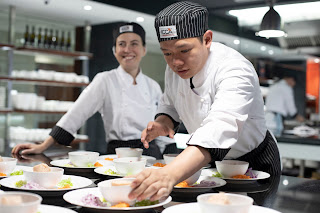In the art and science of cooking, mastery begins with the fundamentals. Professional chef training is designed to equip aspiring chefs with a solid foundation of culinary skills and techniques, essential for navigating the dynamic and demanding culinary industry. This foundational training is not just about learning to cook; it's about understanding the principles behind cooking methods, the importance of ingredient selection, and the art of presentation. Let's delve into the significance of mastering fundamental culinary skills and techniques in professional chef training and how they form the cornerstone of a successful culinary career.
The Bedrock of Culinary Arts: Knife Skills
Professional chef training starts with the most basic, yet crucial skill set: knife skills. Precision in cutting not only affects the cooking process and the flavor of the dish but also plays a significant role in presentation. Training programs emphasize various cutting techniques such as julienning, dicing, and chiffonading, ensuring that students are proficient in producing consistent and precise cuts. Mastering knife skills is akin to learning the alphabet before writing a novel; it is the foundation upon which all culinary creations are built.
The Symphony of Cooking Methods
Understanding and mastering various cooking methods form the core of professional chef training. Each method, from boiling and steaming to roasting and grilling, imparts unique flavors and textures to ingredients, opening a world of possibilities for culinary creativity. Professional training programs meticulously cover these techniques, teaching aspiring chefs when and how to apply each method to achieve desired results. This knowledge is vital for the development of a chef's intuition in the kitchen, enabling them to innovate and adapt recipes with confidence.
The Science of Flavor: Ingredient Selection
Selecting the right ingredients is an art that professional chefs learn to master during their training. The quality, freshness, and seasonality of ingredients significantly impact the taste and nutritional value of a dish. Professional chef training programs often include modules on how to source and select the best ingredients, fostering an appreciation for the flavors and textures that different ingredients bring to the table. This understanding is crucial for creating dishes that are not only delicious but also visually appealing and nutritionally balanced.
Plating and Presentation: The Art of Culinary Aesthetics
In the culinary world, the first impression is made through the eyes. Plating and presentation are essential components of professional chef training, teaching students the art of arranging food on the plate in an aesthetically pleasing manner. This aspect of training goes beyond mere decoration; it's about enhancing the overall dining experience by engaging the senses and evoking emotions. Aspiring chefs learn to use color, texture, and composition to create visually stunning dishes that tell a story, making the act of eating a memorable experience.
Innovation Through Techniques
Professional chef training is not just about learning established techniques; it's also about encouraging innovation. As culinary technology advances, chefs must stay abreast of new techniques and equipment that can elevate their cooking. Modern training programs incorporate lessons on sous-vide cooking, molecular gastronomy, and other avant-garde culinary techniques, pushing students to think outside the traditional culinary box and explore new frontiers in food preparation and presentation.
Conclusion
Mastering the fundamentals through professional chef training is the first step in a chef's journey to culinary excellence. These skills and techniques are the building blocks of culinary creativity, allowing chefs to innovate, adapt, and excel in the fast-paced culinary world. As the culinary landscape continues to evolve, the importance of a strong foundation in these fundamentals remains constant, underscoring the value of comprehensive professional chef training. For those aspiring to make their mark in the culinary industry, understanding and mastering these basics is not just important—it's essential.

Comments
Post a Comment